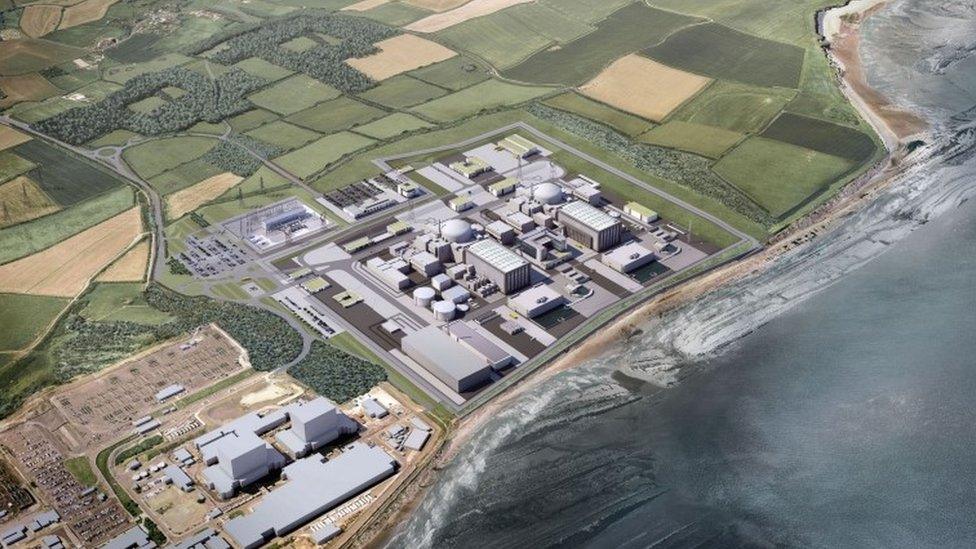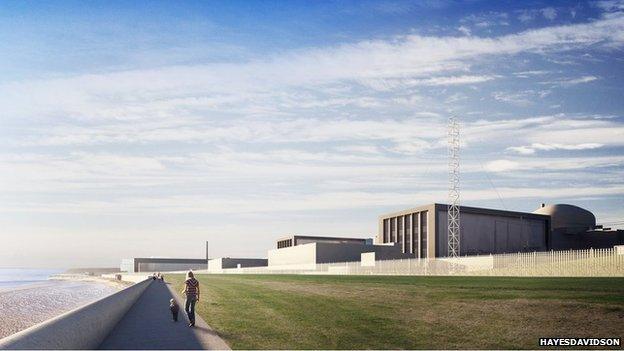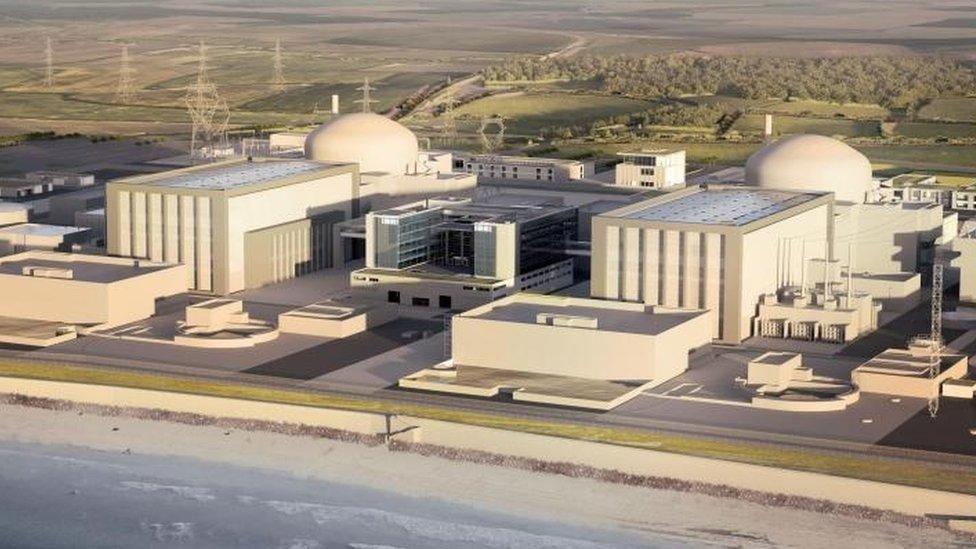All you need to know about Hinkley Point
- Published

Artist's impression of Hinkley Point C building proposals
Hinkley Point is a sleeping giant of a project. And it has now been confirmed that a project announced nearly eight years ago will continue to sleep just a little longer.
At £24bn, it's the biggest and riskiest energy infrastructure project in British history and the decision as to whether it goes ahead lies with EDF's major shareholder - the government of France.
Speaking this evening, the French Finance Minister, Emmanuel Macron said the green light would not be lit until the beginning of May but signalled the French government's strong support.
"The principal nuclear project in the developed world is Hinkley Point. Can we legitimately choose not to take part in the largest nuclear project in the developed world? For my part, I don't think so."
Who's in charge?
Very positive, but hang on a minute you may well ask - how did we arrive at a point where a foreign government is calling the shots on UK energy policy?
You have to go back to 2008 when the UK essentially surrendered its sovereignty over its nuclear industry when British Energy and its stable of eight nuclear power plants was sold to the French energy giant EDF.
British Gas owner Centrica took a 25% stake which it later jettisoned. The rationale was that EDF knew what it was doing having built 58 plants in France supplying 80% of the country's electricity. Leave it to the experts.

The diggers are standing by to start work on Hinkley Point
Fine, so EDF will build it, who is going to pay for it? Definitely NOT the state - or not this state anyway. That was the view in UK government and in particular the Lib Dems who were adamant there should be no UK state subsidy of nuclear.
The risk should fall entirely on the contractor - essentially the French government. If it doesn't get finished, we don't pay a penny, was their idea.
That's fine. But in order to shoulder that risk, we need to be sure it's going to be worth it in the end. We need a guarantee that the price we get for the electricity we produce will compensate us for all the risk we are taking.
Add to the mix the pressure that was piling up on the government to start spending money on infrastructure - and in particular energy infrastructure - and the message to Ed Davey was "do something, do anything" and so he did a deal guaranteeing EDF a price of £92.50 per Megawatt hour. Nearly three times the current price.
What will happen?
EDF faces substantial risks if it goes ahead. Not only does it have to come up with the cash to complete the project - it also has to find €55bn to service France's ageing 58-strong nuclear power station fleet.
Hinkley is not the only call on the French giant's purse. Having said that, it is the biggest. The Somerset project will soak up 15-20% of all the French company's cash over the next decade. That was a chunk its finance director - the person who knew EDF's finance's better than anyone - was unprepared to stand by and watch it digest. He resigned as he thought Hinkley could jeopardise the financial future of the firm. He left because he was at odds with the rest of the board and French politicians who are keen to press ahead as Monsieur Macron indicated tonight.
Is it a good deal?
That depends who you ask. EDF, the UK government or British consumers.
EDF: The ex-CFO has voted with his feet. It's not hard to see why he has such misgivings. Despite being the experts, EDF's recent track record on building reactors is poor. Smaller but similar projects in France, Finland and China are years behind schedule and massively over budget.
On its own, EDF could not take this on as it could ruin the company. The government has agreed in principle to underwrite it by giving EDF the freedom to sell off the family silver (like a stake in the French equivalent of National Grid) and it may need to raise more cash by creating efficiencies (code for sacking people).
French unions hold seats on the EDF board. On the other hand, if it pulls it off, it will be the most profitable project it has ever done.
What does it mean for UK Government?
Some of the high risks have been removed. The UK government won't pay a penny if the project isn't completed. EDF is on the hook for the risk of delivering a fiendishly difficult and delay-strewn process. What is clear is that the UK government has placed great political capital in infrastructure capital.
The message seems to be - please for goodness sake build something. The earth movers are standing by - can it afford to keep them idle much longer?
What does it mean for UK consumers?
This is a tough one. The price EDF has negotiated for the electricity that Hinkley will one day produce looks very high by current standards. £92.50 per megawatt hour of electricity is nearly three times the current price.
Sounds mad - but the reality is that NO ONE knows what the average price of electricity will be in the decades between 2025 and 2060. Add to that when the decommissioning costs are factored in, the future carbon penalties for coal and gas are unknown, and that nuclear counts as a near zero carbon source of energy, and the maths is practically impossible to do.
This sleeping giant is due to wake in May. Whether it crushes EDF underfoot or makes a colossal contribution to its bottom line will take at least a decade to determine. The UK and French governments are in this up to their neck and it's hard to see them pulling out now.
- Published22 March 2016

- Published12 March 2016
